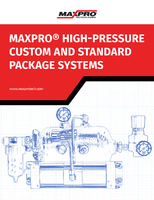Gaseous Fuels Committee seeks new participants.
Press Release Summary:
Interested parties are invited to participate in standards developing activities of ASTM International Committee D03 on Gaseous Fuels. Standards currently in development include ASTM WK24874, Test Method for the Determination of Moisture Vapor Concentration in Natural Gas and by Tunable Diode Laser Spectroscopy (TDLAS), and ASTM WK24875, Practice for On-Line Determination of Siloxanes in Biogas and Other Gaseous Fuels by FTIR.
Original Press Release:
ASTM Gaseous Fuels Committee at Work on Proposed Standards for Tunable Diode Laser Spectroscopy and Determination of Siloxanes
W. CONSHOHOCKEN, Pa., October 7, 2009-ASTM International Committee D03 on Gaseous Fuels invites all interested parties to participate in their standards developing activities. Proposed new standards currently being developed by subcommittees within D03 include ASTM WK24874, Test Method for the Determination of Moisture Vapor Concentration in Natural Gas and by Tunable Diode Laser Spectroscopy (TDLAS), and ASTM WK24875, Practice for On-Line Determination of Siloxanes in Biogas and Other Gaseous Fuels by FTIR.
Tunable Diode Laser Spectroscopy
The proposed new standard, ASTM WK24874, is being developed at the request of several gas companies that use TDLAS analyzers for the measurement of moisture in natural gas. While TDLAS has become a popular type of gas analysis, no specific standard currently exists for its use.
ASTM WK24874 is under the jurisdiction of Subcommittee D03.12 on On-Line/At-Line Analysis of Gaseous Fuels.
According to Samuel Miller, D03 member and director of product line management, natural gas industry, SpectraSensors Inc., the proposed new standard will primarily be used for measuring moisture in methane or natural gas with consideration for the following specific applications:
Siloxanes
While biofuel from landfills and sewage digestion has been used as fuel for local gas turbine engines, it is necessary to hold the content of siloxanes within the fuel down to 50 parts per billion. Siloxanes that can coat the turbine under working conditions are converted to an abrasive silicone dioxide coating that greatly reduces the lifetime of the engine.
ASTM WK24875 is currently being developed to fill the need for a standard that can measure siloxanes in biofuel mixtures. The proposed standard is being developed by Subcommittee D03.05 on Determination of Special Constituents of Gaseous Fuels.
Barbara Marshik, D03 member and product development manager, on-line product group, MKS Instruments, says that ASTM WK24875 will allow for the field analysis of siloxanes in real time at the ppb level required for the purified process gas stream.
"This technique does not require daily calibrations in order to obtain the correct concentration values found within the gas stream," says Marshik. "Once the initial calibrations are created, only verification testing is required after that point, and those are not done on a daily basis, all of which greatly reduces the analysis time."
Marshik says that, once it has been approved, ASTM WK24875 will be used by landfill gas and sewage digester personnel responsible for measuring biogas composition in its crude form as well as by those responsible for analyzing the composition both during and after the purification/removal of siloxanes to form the final biofuel product.
For technical information, contact: (WK24874) Samuel Miller, SpectraSensors Inc., Rancho Cucamonga, Calif. (phone: 909-948-4106; smiller@spectrasensors.com); (WK24875) Barbara Marshik, MKS Instruments, Methuen, Mass. (phone: 978-738-3106; barbara_marshik@mksinst.com). Committee D03 will meet Dec. 7-9 in Anaheim, Calif.
ASTM International welcomes and encourages participation in the development of its standards. ASTM's open consensus process, using advance Internet-based standards development tools, ensures worldwide access for all interested individuals. For more information on becoming an ASTM member, please contact Brynn Murphy, ASTM International (phone: 610-832-9640; bmurphy@astm.org).
Established in 1898, ASTM International is one of the largest international standards development and delivery systems in the world. ASTM International meets the World Trade Organization (WTO) principles for the development of international standards: coherence, consensus, development dimension, effectiveness, impartiality, openness, relevance and transparency. ASTM standards are accepted and used in research and development, product testing, quality systems and commercial transactions around the globe.




